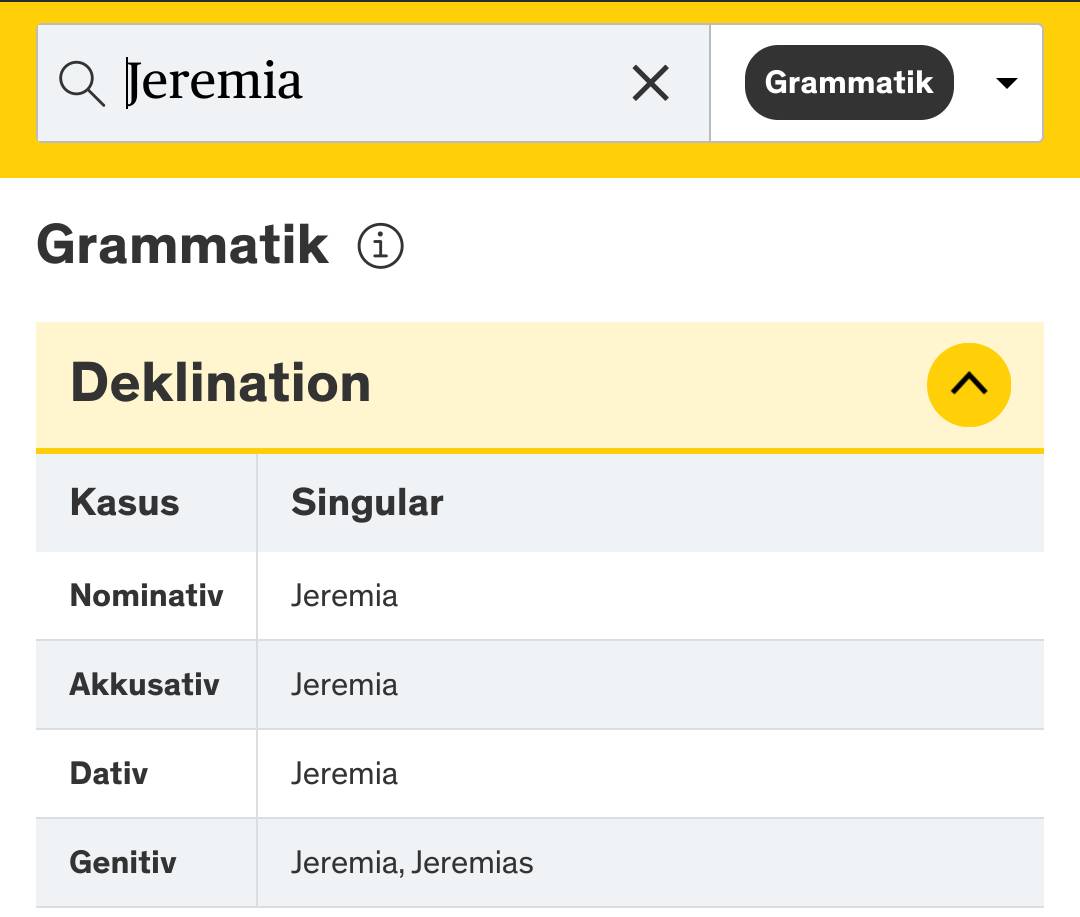- cross-posted to:
- worldnews@civilloquy.com
- globalnews@lemmy.zip
- cross-posted to:
- worldnews@civilloquy.com
- globalnews@lemmy.zip
“There is a long tradition of conservative circles fretting about international influences on the German languages,” said Stefanowitsch. “It used to be French, and now it’s mainly English”.
Heh.
The problem with defending the purity of the English language is that English is about as pure as a cribhouse whore. We don’t just borrow words; on occasion, English has pursued other languages down alleyways to beat them unconscious and rifle their pockets for new vocabulary.
However, guidelines issued by the body regulating the use of Standard High German orthography have clarified that the use of the punctuation mark colloquially known as the Deppenapostroph (“idiot’s apostrophe”) has become so widespread that it is permissible – as long as it separates the genitive ‘s’ within a proper name.
Hmm.
So how do they deal with the more-complex cases?
https://www.thesaurus.com/e/grammar/whats-the-rule-for-doing-a-possessive-after-the-word-s/
Singular nouns ending in S
Rule 1: In general, you form a possessive singular noun (both proper and common) by adding an apostrophe and the letter S to the end of the word.
-
the flower’s petals
-
Riley’s car
That’s simple enough. It’s when the car belongs to a person named Chris, or we’re talking about the petals of a crocus that the rules get blurry. Most experts and guides say you should add an apostrophe and an S to both proper and common nouns to make them possessive even when they end in S. So, using the examples above, it would be:
* Chris’s car
- the crocus’s petals
Not everyone agrees with this method, however, and some, such as the Associated Press Stylebook, nod in favor of adding only an apostrophe to make a proper noun possessive, such as:
-
Chris’ car
-
Dickens’ novels
To add even more confusion, AP Style also has an exception if the word following the possessive starts with an S, stating that in those cases only the apostrophe should be added. So it would be:
- Texas’s people
Texas’ streams
In 2019, the AP raised quite the ruckus when they tweeted that they were considering adding an S after the apostrophe for singular proper nouns, as in Mavis Staples’s album or Martha Reeves’s concert. To date, no changes have been made, but as you can see, it’s an ever-evolving, highly volatile topic.
Plural nouns ending in S
Rule 2: Plural nouns, on the other hand, generally don’t get an extra S, just an apostrophe. Most experts suggest you form the plural form of the word first, then add the apostrophe.
For example:
-
the Joneses’ house
-
the classes’ rules
Most say possessive words should generally read as you would speak them.
The one-syllable rule
When it comes to historical proper names or those found in the Bible, however, there is another rule many choose to follow.
Rule 3: According to some, those words with two or more syllables typically just get an apostrophe after the final S, while one-syllable words getting both an apostrophe and an S.
For example:
-
Jesus’ teachings
-
Zeus’s temper
Some people apply it to more recent names as well, such as Dr. Seuss’s writings or Kenny Rogers’ songs, while others believe they all should also get an additional S.
Singular nouns in plural form
Rule 4: When it comes to singular nouns that are plural words, they typically just get the apostrophe.
For example, the Beatles is a singular noun, but it’s in the form of a plural word. So, it would be:
- The Beatles’ album
For the sake of …
Rule 5: Whether a noun ends in an S or not, if it’s followed by the word sake, most say it just gets an apostrophe.
For example:
-
for goodness’ sake
-
for conscience’ sake
-
for appearance’ sake
Others, such as the Chicago Manual of Style, say if the word before sake ends in an S, then it should just get an apostrophe. Others should get an apostrophe and an S. So, it would be:
-
for goodness’ sake
-
for conscience’s sake
-
for appearance’s sake
Like, there’s a whole rabbit hole to go down there.
In German it would be like:
Franks Haus.
Franz’ Haus.
A way without the apostrophe could also be „Franzens Haus“ (but that’s out of style since a few decades)
While you’re right that there is a rabbit hole to go down, we just didn’t have a solution for this so far.
“Matthias’ car” translates as “Matthias Auto”, which could also be a new Disney character.The problem is much less frequent in German, though, because our plurals don’t generally end with a ‘s’.
What? That’s completely untrue! Any time, the word ends on an s sound, the apostrophe moves to [the end of the word].
Matthias’s car (or alternatively, Matthias’ car) is Matthias’ Auto.
Assuming the final e is not pronounced, Alice’s car becomes Alice’ Auto. Alternatively, it can be Alices Auto if the final e is pronounced.
Interestingly, the Duden also spits out
Matthias'as possible genitive: https://www.duden.de/deklination/substantive/Matthias_Vorname
But I was then unsure, if they had already integrated the Deppenapostroph-rule.I wouldn’t know having seen an apostrophe in genitive in a formal text before, but no idea. Maybe there’s regional differences. Would explain why Duden lists both.
Original German comment:
Interessanterweise hat der Duden auch
Matthias'als möglichen Genitiv ausgespuckt: https://www.duden.de/deklination/substantive/Matthias_Vorname
Aber ich war mir dann unsicher, ob die schon direkt die Deppenapostroph-Regel aufgenommen hatten.Ich wüsste nicht, dass ich schonmal einen Apostroph beim Genitiv in einem formalen Text gesehen hätte, aber ja, kein Plan. Vielleicht gibt’s da auch regionale Unterschiede. Würde erklären, warum der Duden beides listet…
(Ftr: This is an English-language community.)
But Duden listing Matthias as a possible genitive is wild. It seems they just list it in a weird way, because Jeremia is certainly not a reasonable genitive of Jeremia:

Hmm, I think Jeremia is an irregular case, due to it mostly being a biblical name and I think in biblical texts, they write it as “des Jeremia”. No idea, if that was just en vogue when the bible got translated or what the reason is for that.
But the Duden describes the general rule of thumb for nouns ending in ‘s’ (or similar sounds) by extending them with “-es”: https://www.duden.de/sprachwissen/sprachratgeber/Genitiv-auf-s-oder-es
But “des Matthiases” just sounds archaic.
They also list “des Hans” as the only possible genitive: https://www.duden.de/deklination/substantive/Hans_Mann
So, maybe these are special cases, too…
-
Language is democratic. If people are starting to speak or write in a certain way, that is the correct way to use a language. I know that we have all these organizations trying to define “correct” language use, but if many Germans are deciding that they want to use this apostrophe, that should be correct.
And there is another issue: There are a lot of people looking down on people who can’t read or write correctly. You can see this here: people are calling other people itiots just because they are using an apostrophe in a not officially accepted way. Which should never, never happen
First off, a) Standard German is not a language that’s spoken anywhere in the country in the first place, not even at the Tagesschau studios. It’s a solely literary language, defined somewhat semi-democratically by book and newspaper editors and b) this is about orthography, not language qua language.
This is not about telling people whether they should say “ich bin am gehen” or “ich bin gehend” – both are incorrect in Standard Geman, the reason it doesn’t have a present progressive is that people couldn’t agree which form to use, and the different forms are quite far apart. So it’s avoided by editors, hence it’s not part of the language, “ich gehe gerade” is used instead which is (IMNSHO) unnatural but also not terribly awkward. That kind of thing is way more at odds with how people actually speak than orthography, and accepted without second thought: Because Standard German is a Dachsprache. If I want to talk to a Bavarian, compromises will have to be made.
Then, an orthography has to be, and this might be surprising to Anglophones, one thing: Logical and predictable, inferrable from how you speak and what things mean. The idiot’s apostrophe is not. It makes no sense, it follows no rule. If I say “gehn” then I can infer, from a uniform rule, that I should write “gehen” – because folks in the south say “gehe”, and well a compromise is when noone is happy. But using a different rule for “the dog’s bone” and “Jane’s bar”? There’s no justification for that. None. It introduces a distinction where there’s none.
The issue I have with this whole thing isn’t that it seems to be influenced by English, the issue I have is that it makes as much sense as English orthography.
As the commenter above you said, people use language differently than how formal rules describe. Is it a kind of capitulation for a formal rules body to change in response? Yes, probably. But so what? If someone doesn’t like it take it up with the general population.
As you might have gleaned from my comment, everyone uses language differently. Very differently. Scots vs. English kind of differently and that’s not even covering all autochthone minorities. To make sure the whole country has a way to understand each other we need to agree on a standard that’s half-way acceptable and half-way convenient to everyone. In setting that standard, why should we follow the practices of simple but bold businessmen (“Lara’s hair stylez”) over newspapers. One knows stuff about hair and not so much language, the other knows quite a bit about language and less about hair. Why are we asking plumbers how to bake bread and bakers how to fix faucets. Explain it to me.
Some questions: Is it your position that people can’t understand each other when using this apostrophe? Are you saying that only business people use this apostrophe? And are you saying that the only people who can be trusted to correctly use language are those at newspapers?
No, no, and no.
The question is whether what’s understood as the standard is set by bowing to random influence from people being careless or plain uninformed, or by reference to how people specialising in the thing do it.
This whole thing is just a declaration of bankruptcy on part of the standards body because the natural authorities of the language – and that’s editors, not barkeeps – will not be adopting this one. They also prevented some details about the 1996 spelling reform, while adopting the rest: In the end it was the reform that bent to the editors, not the editors bending to the standards body.
You’re talking about “But shouldn’t randos be free to choose how they spell things” – yes, and they are. And the rest of the republic is free to consider that usage wrong, especially if those randos didn’t choose a spelling, but simply didn’t care. The standards body saying “hey shouldn’t this be right” has no authority over the opinion of the rest of the republic we’re not in France.
What is your opinion on people using “would of” instead of “would have”?
I don’t think that accepting the lowest common denominator or following the tyrrany of majority is particularly democratic, when it’s clearly destroying the meaning of the language.
Sure, so let’s say we accept it, but then how do we teach children these new rules? It’ll only result in further degradation of the language because nobody knows what is right or wrong anymore.
Well for starters, kids aren’t going to whinge about it- they’re just going to use it, generally correctly for their setting.
Headlines when a royal family kid is bilingual, every day regular-ass survival when a poor border town kid does it, unprompted.
I mean, the royal kids totally would of got it on their own, right?
Aren’t royals supposed to be bilingual? Like, that’s part of their job
There was one royal kid-a girl- who learned spanish.
It made headlines.
I assume her accent is so bad as to be largely unintelligible to most spanish speaking folks.
They have translators.
Border kids learn both on their own or they starve
Seems pretty straightforward… Teach it like we always have, and then just add a quick, “the traditional contraction expands into, ‘should have,’ but recently, ‘should of’ has become popular colloquially despite the apparent error.”
Or something like that, I don’t know. It’s not like English doesn’t already have a billion exceptions to every single rule. What’s one more slang term?
Do I like it? Fuck no. It sounds/looks bad, and I will probably silently judge you if you say or write it lol
Language is democratic. If people are starting to speak or write in a certain way, that is the correct way to use a language
What’s popular is what’s correct. We get it.
That’s why the language is evolving based on influencers, people too stupid to KNOW the syntax guiding the path forward.
Nice going.
Removed by mod
So what is the proper thing to do when someone’s comment is completely unintelligible to me? The lack of punctuation and using the wrong version of there/their/they’re, to/too, etc. often makes for sentences I can’t even begin to make sense of. They see no problem with it, and other people seem to have no issue parsing it, so asking for clarification usually just gets the same response as being a mean about it, in my experience.
There are ways to ask for clarification without coming across as patronizing or condescending…
You don’t even necessarily need to be overly polite about it. Why not just, “What does that even mean? Can you clarify?” or maybe just, “Your comment is unclear.”
If they refuse to clarify… then yeah condescend away.
I know I can be guilty of mocking people making stupid arguments using horrendous grammar, but that’s more about the content of their arguments… If they weren’t literal fascists, I would have no problem being more courteous when pointing out nonsensical comments.
I don’t think language is entirely beholden to democracy. Contrary to the beliefs of
pedantsEnglish teachers, I think we are each empowered to utilize it how we wish, without concern for any broader consensus.For example, I have unilaterally deprecated “its”.
Following normal grammatical rules, “+s” indicates plurality, not possession. “Its” violates this rule.
The “+'s” construction is used to indicate both contraction (with “is” or “was”) and possession. “It’s” follows either set of rules, depending on context. There is no significant risk of ambiguity between the two meanings. “It’s” is a perfectly cromulent homonym for both meanings.
As there is no need for a plural form of an inherently singular word, “its” is no longer a word.
It’s: the exception that proves the rule.
Exceptions disprove rules.
Hey what flavour is that paste?
Meanwhile in English, the semicolon is dead – long live the dash.
I regularly use the semicolon; it makes me happy.
Can relate ;)
As long as you’re communicating your ideas clearly, to each their own!
Skibidi toilet my Ohio, skibidi toilet
They serve different functions; each has different length - visually, verbally, and semantically.
Hyphen -
En Dash –
Em Dash —
- – —
Parkour civilization.
waoh,
i cannot believe how hard I’ve been read
That’s a colon not a semicolon.
See an optometrist.
If the problem is with a colon, wouldn’t a proctologist be a better choice?
I forgor which is which
The semicolon has a slight boner.
That points down?
Age is a bitch.
deleted by creator
I think they meant in common usage; that’s the impression I get - just sayin’.
the semicolon is dead – long live the dash.
I see what you did there. But a colon would be best, right ?
True – the colon still has its utility, but the dash is multifunctional (perhaps less formal).
As long as it’s an em dash (—) and not a hyphen (-) I’m OK with it. A double hyphen is acceptable but not ideal.
Hide yo’ kids, hide yo’ wife, the lingua franca English is coming for yo’ Deutsch.
I cringe every time I see it, but just because I don’t like it doesn’t mean it should be wrong. It is super wide spread to use it that way (even more wide spread than the “correct” way), so it should be considered legal imho. Sidenote: I also hate that the plural of “house” isn’t “hice” in eglish, but what can I do.
Rice isn’t the plural of rouse, either. Dice is valid as singular and plural, no relation to douse. English is a language of exceptions rather than rules.
The singular of “dice” was traditionally “die”, but it seems to be well on its way out
Is it? Everyone I play tabletop games with uses die for singular.
I do too, but I think that those of us that play tabletop ganes probably think more about dice a lot more than the average person
There are dozens of us!!
I have recently encountered a fellow who used ‘die’ as the plural
I know. My feelings aren’t based on any rules. It’s more of a gut feeling. “Houses” jus feels kimd of clumsy to me. The plural of “mouse” isn’t “mouses” either. It just sounds weird to me.
One sock, a pair of socks, a pile of soxen.
Truly the English are a plague unto the world
They’re also the reason we can communicate with almost everyone on the world. (that’s younger than 50 and not French)
Imagine the Internet without a common language.
Considering that American’s use apostrophe’s against even the proper American English form…
They can probably just use the idiot part.
This battle has been lost a long time ago in Dutch. Although to be fair, for “Kati’s kiosk” it would have been fine anyway, since otherwise the pronunciation changes.
Language keeps evolving, and English is coming for us all.
My main gripe with it is people that don’t use a ', but literally any other uptick/accent they can find, as you can see with Rosi`s Bar in the article. Also commonplace is places that sell ‘Crepe’s’
But tell me, how does the German pronunciation of Katis and Kati’s differ? It’s still spoken the same way.
I was talking about the Dutch pronunciation, so a long vs a short
i.Exact same pronunciation, at least in Northern and Standard.
The English disease of putting spaces in a compound word might be worse… it’s not even consistent. It’ll be a new example of “Dutch grammar is 50% special cases.”
We have that in German as well. But I think that one is accelerated by the fact that keyboards suck at predicting compound words and often it’s just easier to type them as two separate words. I have been guilty of that, even though I would never write them with a space by hand or typing on a physical keyboard.
Languages and grammar change over time.
I normally complain about American English and the atrocious things they do to the language, so I’m on the side of the high German here.
There is no better way to wind up Americans than writing in British English.
Schools in Germany regularly teach BE rather than AE.
Fortunately.
Unfortunately, the quality of that teaching largely depends on the individual teacher, which greatly varies, and for which there barely is a lower limit, though.
There are plenty, let’s be honest mate lol
Watch out. A Trojan’s Horse!
How’s it feel rest of the world? To have English seep into your language after so many centuries of only having your languages seep into English.
But for real, I get both sides here, apostrophic possession is nice, it’s convenient, it’s useful, and it’s foreign. I’m sure many Germans are mad, but it seems like it’s Germans doing the thing pissing them off.
How’s it feel rest of the world? To have English seep into your language after so many centuries of only having your languages seep into English.
French:

Although, aside from the great vowel shift, we gladly contributed at fucking up English orthography.
In German we simply add an s for the genitive, and we add an apostrophe when a letter is missing.
For example Jacob’s book would be “Jakobs Buch” ¹ but John’s book would be “Johannes’ Buch”, not “Johannes’s Buch” ² and also not “Johannes’’ Buch” ³.
¹ not “Jakob’s Buch”, which is called the “Deppenapostroph” - fool’s apostrophe
² fool’s apostrophe
³ fool’s apostrophe and a second apostrophe to mark the cancelled letter
The genitive is nice, convenient and useful, yes. But there’s no reason to add an apostrophe when no letter is missing.
(And as explained above, no, it is not foreign, this isn’t changing anything in spoken language either, it’s just a common spelling error due to commonly seeing it in English)
To draw a comparison regarding how annoying it is for anyone who cares about written language: It’s quite similar to as if people in English suddenly started marking the plural with an apostrophe. Or if “would of” instead of “would have” would become correct.
Idk what to tell you, but when people start spelling things differently because they see it that way in a foreign language and think their language is the same that’s borrowing a grammatical rule from a foreign language. It starts by being wrong, then it becomes a common mistake, then an alternative rule, then eventually ya borrowed it. The mistake is the quantum component of natural evolution whether it’s DNA, language, or anything else self replicating.
We actually also do the apostrophe for when a letter is missing as well as the genitive. Probably got the former off y’all and nicked the latter from some other language. We speak frankenstein’s language after all.
Personally I have no say in this. When using German as a native English speaker my aim is to mimic and err on the side of more “correct”. If Germans keep making this mistake though some are bound to eventually make it a stylistic choice or do it because it’s natural to them.
So if many people (still a minority by a large margin of course) started writing things like “I would of visited the museum’s today but I saw two rare bird’s, their just so fascinating.” it should become correct?
It’s not like a majority is using apostrophes for the genitive in German. But since it’s so easy to spot the few % of miswritten genitives just stand out.
So out of curiosity I found out how it happened in English and it’s dumber than I could’ve imagined. So yeah, idiots being wrong absolutely can eventually make it correct.
If it’s commonly understood, yes. That is how language works. Words change over time. Reading “would of” is jarring as fuck but it’s also not really mistakable for anything other than would’ve.
Rosi’s bar is wrong. It’s R O S I 'S
Removed by mod
hey germany, considering your history maybe you shouldn’t be making a fuss about linguistic purity?
just a thought.I’m glad they changed is, german spelling is horrible
Removed by mod
Removed by mod
Removed by mod
Removed by mod
This person when working at an ice cream parlour:

English explanation
The German word Keks translates to cookie/biscuit. Its plural case is Kekse.
So the person who wrote the sign put an apostrophe inside a word in singular case. It’s like spelling “school bus” as “school bu’s”.
The problem is, that with the change, it’ll become even more horrible.














